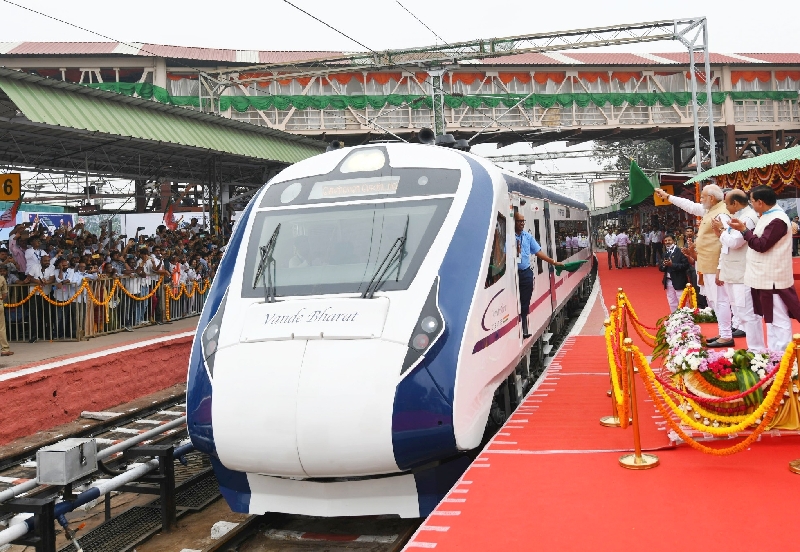Railway cancels tender for 100 Vande Bharat trains
While Alstom India had agreed to lower their bid price from the initial ₹150.9 crore quoted in May 2023, the Indian Railways and the company failed to arrive at a final price point
The Vande Bharat is a semi-high-speed train consisting of 16 self-propelled coaches
The #IndianRailways has cancelled its ₹30,000 crore #Tender for manufacturing and maintenance of 100 aluminium body #VandeBharat trains, Olivier Loison, Managing Director, Alstom India, told.
“Indian Railways has cancelled the tender. However, with our strong local knowledge and investments in industrial and human capital over the years, we are well-positioned and committed to support the realisation of this vision [of the railways] in the future, should the opportunity arise,” Loison said.
At odds over the bidding price
According to #Railway officials, the tender panel found the #French multinational company’s (#MNC) bidding price of ₹150.9 crore per train set to be too high and urged it to cap it at ₹140 crore.
However, #AlstomIndia wanted to seal the deal at around ₹145 crore per train set. The French company had emerged as the lowest bidder for the ₹30,000 crore tender, which was opened on May 30, 2023. The firm had made a bid of ₹150.9 crore per train set and was looking to manufacture all 100 Vande Bharat rakes, the documents revealed.
The cancellation of the #contract helps Indian Railways to buy more time to get the best possible prize. The bidders, too, will be better prepared to set up adequate #manufacturing facilities,” an official said.
Emails sent to the Ministry of Railways remained unanswered till the time of publishing.
Did #Alstom quote a ‘good price’?
In July 2023, “Alstom’s chief executive officer Henri Poupart-Lafarge had said that the company” https://www.moneycontrol.com/news/business/indian-railways-may-again-push-the-deadline-for-100-vande-bharat-trains-10169061.html will deploy new #aluminium tech for the project. In an interview with CNBC TV-18 in July last year, Poupart-Lafarge had maintained that the company “quoted a good price for the project”.
Earlier, the contract to manufacture 200 Vande Bharat #sleeper train sets – all made of stainless steel – was granted at ₹120 crore per rake, according to an official.
Competition was essential
Another official reasoned that #competition was essential to get the best price. The official said the next round of tender would invite multiple players, as compared to only two in the latest exercise, to ensure timely #production of the #train-sets.
The first official explained the #eligibility norms to qualify for the tender stipulated companies must have a research and development (R&D) facility to ensure that they can manufacture a prototype, and also have the capacity to assemble at least five train sets a year.
Altogether, 100 train sets to be delivered within seven years.
The consortium, comprising Swiss railway rolling stock manufacturer #StadlerRail and Hyderabad-based #MedhaServoDrives, was the only other #bidder apart from Alstom India, and had made a bid of around ₹170 crore per train set.
As per the terms of the contract, the winning bidder will receive ₹13,000 crore upon delivery of the train sets and the remainder ₹17,000 crore to be paid for maintenance over 35 years.
Bidders few and far between
Officials had anticipated at least five bids for the tender, including German major #Siemens in partnership with Bharat Earth Movers Limited (}BEML), Russia’s #Transmashholding and Rail Vikas Nigam Ltd. (RVNL).
However, these companies opted out of the bidding process because they failed to meet the technical norms.
Bids for these trains were called in July 2022 and were to open on February 15, 2023. Later, the closing bid date was extended till February 23, 2023 following a tepid response.
Why aluminium and not stainless steel?
The aluminium train sets are lighter and more energy efficient than those made of stainless steel.
The Indian Railways plans to roll out the first sleeper variant of Vande Bharat trains by the first quarter of 2025.
So far, contracts have been awarded to manufacture 102 and 200 chair car and sleeper Vande Bharat train sets, respectively.
Improved technology powers Vande Bharat
The Vande Bharat is a semi-high-speed train consisting of 16 self-propelled coaches, which eliminate the need for a separate locomotive.
This system, known as distributed traction power, has become increasingly popular worldwide for passenger operations.
Distributed power enables faster acceleration and deceleration compared to loco-hauled trains, which take longer to reach top speed or gradually slow down.
These trains feature improvements such as enhanced seating, an anti-bacterial system in the air conditioning, and the ability to accelerate to 160 kilometres per hour in only 140 seconds.
Courtesy: Moneycontrol.com


